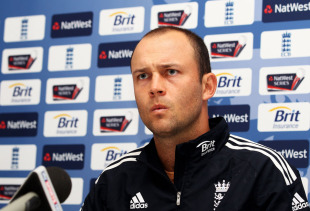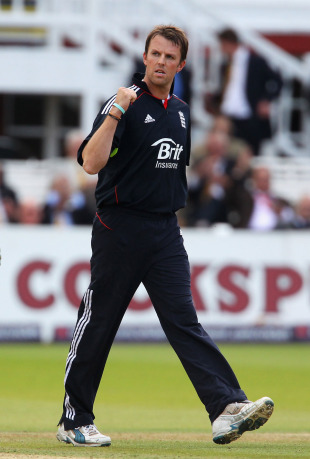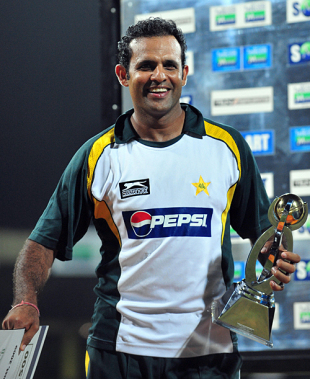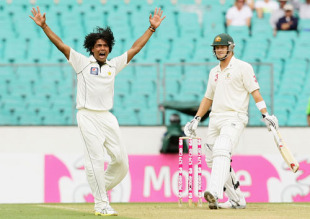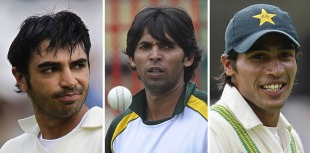England v Pakistan, 4th ODI, Lord's
Gul and Shoaib square the series
September 20, 2010
Pakistan 265 for 7 (Hafeez 64, Swann 4-37) beat England 227 (Strauss 68, Gul 4-32) by 38 runs
Scorecard
Scorecard
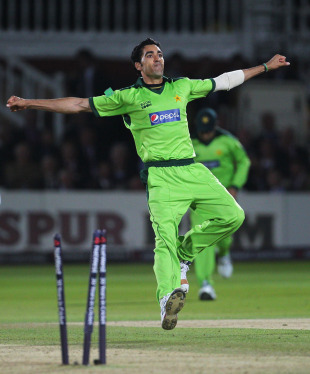
| |||
Pakistan took the one-day series to a decider as they secured a 38-run victory at Lord's with their bowling attack again showing its match-winning qualities, after England's openers had seemingly put their on track to take the series with a 113-run stand. The spinners struck vital blows in the middle-order, then Umar Gul and Shoaib Akhtar became a handful under the floodlights. Earlier, a fearsome late assault from Abdul Razzaq, who hit 40 off his last 10 balls, gave Pakistan a powerful surge.
Under normal circumstances we would now be in for a thrilling end to the season at The Rose Bowl, but this match was played under a horrid atmosphere of legal threats from the England team following Ijaz Butt's extraordinary outburst the day before. Andrew Strauss admitted his team were reluctant participants, but felt the best thing was to complete the series as planned although it took a meeting that stretched into the early hours to decide.
Whatever England's mindset, once the game was on they wanted to be professional and will know a series-clinching victory was there for the taking. They'd been given the ideal platform by Strauss and Steve Davies - which had seemingly nullified Razzaq's innings - but as the floodlights started to take effect on the late-September evening conditions became tougher. However, credit also has to go to Pakistan's bowlers who came back superbly with the spinners proving a handful on a dry surface while Gul was again outstanding.
Strauss flew out of the blocks as Shoaib's first three overs cost 30 and after the initial Powerplay England were 73 without loss with 10 boundaries; in the rest of the innings they only managed another 10. Strauss went to a run-a-ball fifty, his third in a row as he became the second leading run-scorer in ODIs this year, while Davies wasn't far behind until he dragged Saeed Ajmal into his stumps. That wicket brought England to a shuddering halt as Strauss lost the strike and Jonathan Trott, who earlier in the day was involved in an altercation with Wahab Riaz in the nets, struggled to bed in.
The ECB played down the incident between Trott and Riaz, but it was a clear sign of how far the relationship between the two sides has fallen in recent weeks. Trott appeared uneasy in the middle before watching the ball roll back into his stumps from a defensive push against Shahid Afridi. Pakistan didn't try to hide their pleasure at Trott's departure.
They took control a short while later when Strauss fell to his favourite cut shot, picking out backward point perfectly off Shoaib and it left two new batsmen having to settle with the scoring-rate rising. Paul Collingwood, who missed the previous match with a virus, has struggled for most of the season and looked bereft of form before inside-edging Gul into his stumps as England slipped to 149 for 4.
Ian Bell, recalled to the side following his match-winning 107 in the CB40 final on this ground on Saturday, played himself in calmly but having used up 41 balls to reach 27 then drove Ajmal straight to cover. It was down to Eoin Morgan, but he couldn't find anyone to stay with him as Michael Yardy chopped on and Tim Bresnan played all round Gul. England's last chance went when Morgan skied a drive and Mohammad Yousuf, never the sharpest in the field, took a fine running catch at mid-off.
Pakistan's innings had progressed in fits and starts, but was ended in grandstand style by Razzaq who plundered 10 boundaries in the last two overs from James Anderson and Bresnan. Splaying his front leg to drive through the off side during the final Powerplay the quicks couldn't adjust amid the onslaught.
Afridi, playing his 300th ODI, had also supplied his own fireworks and played like a man wanting to make more than a cricketing point. He launched his fourth ball, the last one of Graeme Swann's impressive four-wicket spell, into the second tier of the pavilion and the MCC member who tried to catch it finished with a bloodied face. The Pakistan physio came to his aid, and the member insisted on staying in his seat to watch the remainder of the action. Afridi reached 33 off 16 deliveries at the peak of his assault, but miscued a slower ball from Bresnan to long-on.
The star of England's bowling display was Swann with a wonderful ten overs of offspin. Announced as one of the four candidates for ICC Cricketer of the Year - having been omitted from the original long list in a major blunder - he made his customary first-over breakthrough with a classical offspinner's dismissal as Asad Shafiq was bowled through the gate when he tried to drive. Yet, even the normally jovial Swann couldn't manage his usual expansive celebrations - a sure sign that England would rather not have been playing this match.
Swann added Yousuf, Mohammad Hafeez and Fawad Alam to his haul and Pakistan were fading, but they had power to come and Razzaq's blows proved decisive. However this series, which has included some outstanding one-day cricket, will only be remembered for the wrong reasons. Whoever wins on Wednesday.

